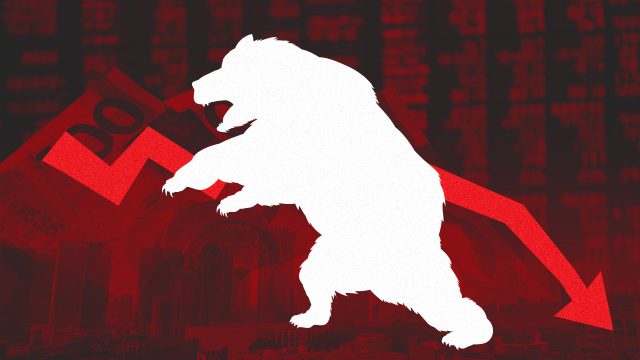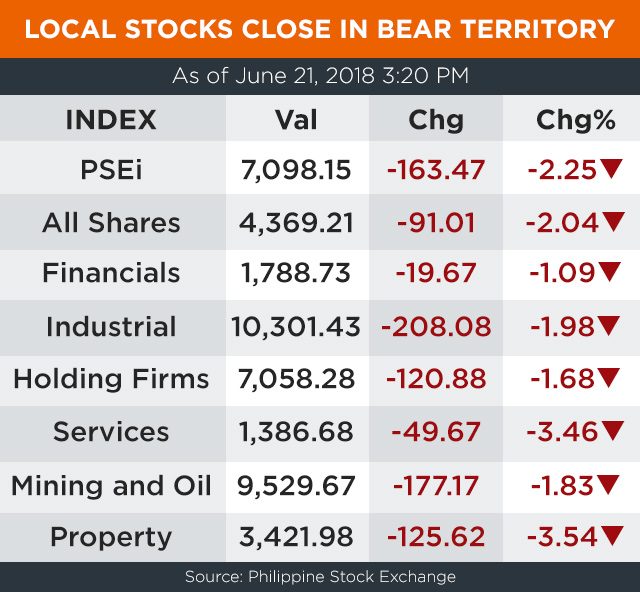SUMMARY
This is AI generated summarization, which may have errors. For context, always refer to the full article.

MANILA, Philippines – The Philippine Stock Exchange index (PSEi) plunged to its weakest level in more than 19 months, closing at 7,098.15 on Thursday, June 21.
The sustained bloodbath in the PSEi confirmed that it is now well within bear market territory. The index shed over 20% from the record high of 9,078.37 last January. (READ: PSE named Southeast Asia’s best stock exchange again)
The benchmark lost 163.47 points or 2.25% at the closing bell.
So far, over $43 billion in market value has been wiped out this year. The PSEi is now Asia’s worst performer.
A bear market occurs when there is widespread pessimism, causing a drop of at least 20% over a two-month period. The term was named after a bear swiping downward at its prey.
The opposite of this is the bull market, named after a bull thrusting its horns upward.

Luis Limlingan, managing director of Regina Capital Development Corporation, said the meltdown in the PSEi showed that “the needed BSP (Bangko Sentral ng Pilipinas) rate hike was still not taken positively as the decision came behind the curve.”
The BSP had imposed another rate hike on Wednesday, June 20, to help temper inflation.
“We were expecting the BSP to wait to hike in August, but policymakers may have opted to act sooner given upside risks to already-above-target inflation in coming months and the further depreciation in the peso (one of the worst-performing currencies in Asia) since early June…. Policymakers appear to want to keep their options open as they assess the incoming data,” Limlingan said.
He added that the bearish sentiment was not isolated to the local bourse.
“US stocks were lifted by a rally in tech shares as concerns eased about a potential global trade war. The S&P 500 broke a 3-day losing streak and the Nasdaq Composite Index added to an all-time high, buoyed by Facebook Incorporated’s rally past $200 a share. However, the Dow Jones Industrial Average posted its 7th consecutive daily decline, its longest losing streak since March 2017. European stocks bounced off a 3-week low as traders came to terms with the further deterioration in trade relations between the US and China,” Limlingan said.
With the current bloodbath in the local bourse, some investors are looking into buying cheap stocks.
But Jonathan Ravelas, chief market strategist of BDO Unibank, quipped in a tweet: “Market investors are now waiting for a dead cat bounce as market levels register cheaper valuations. But the cat is still falling.”
The term “dead cat bounce” means a temporary recovery from a decline or a bear market. The term is based on a dead cat that will bounce after it falls.
Meanwhile, Stock Smarts author Marvin Germo gave this warning: “The market must stay above 7,100 to have a chance not to drop even lower. The market is already relatively oversold, but still in pursuit of its downward projection.” – Rappler.com
Add a comment
How does this make you feel?





There are no comments yet. Add your comment to start the conversation.